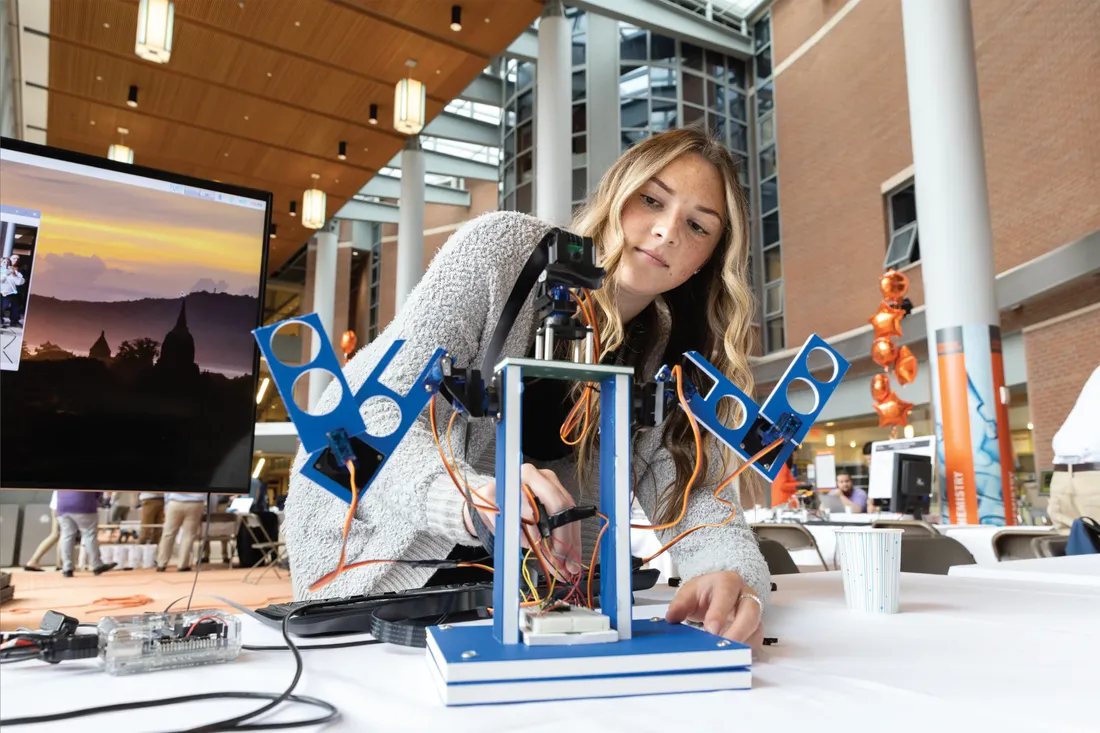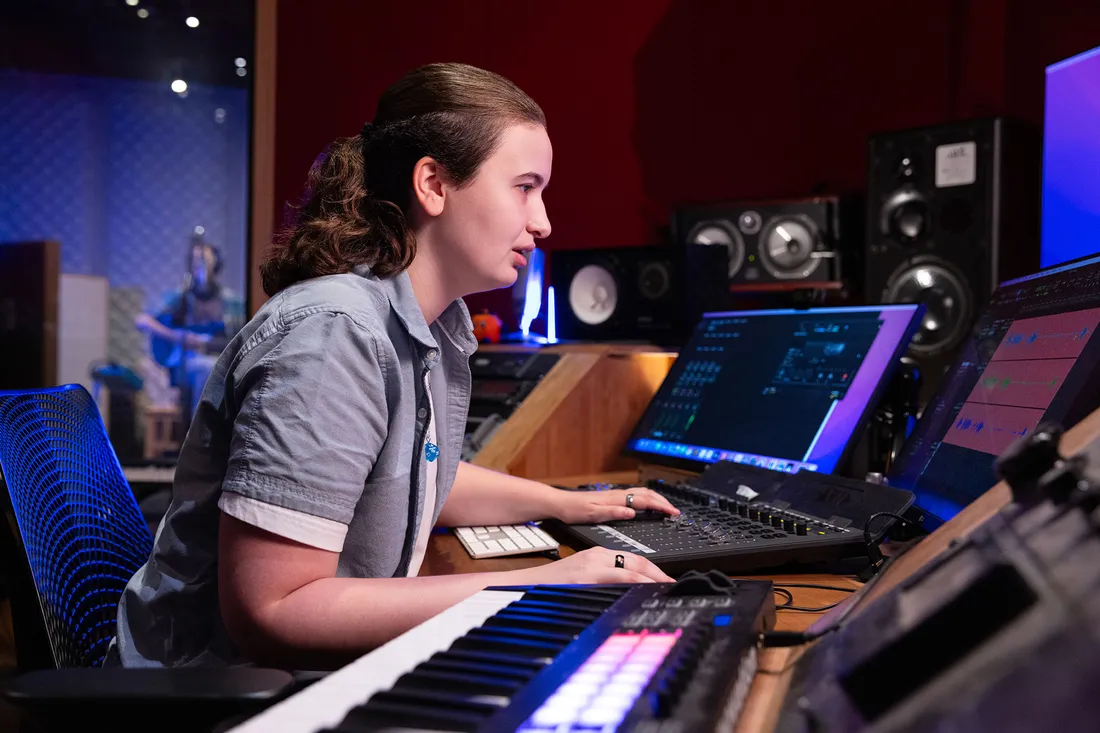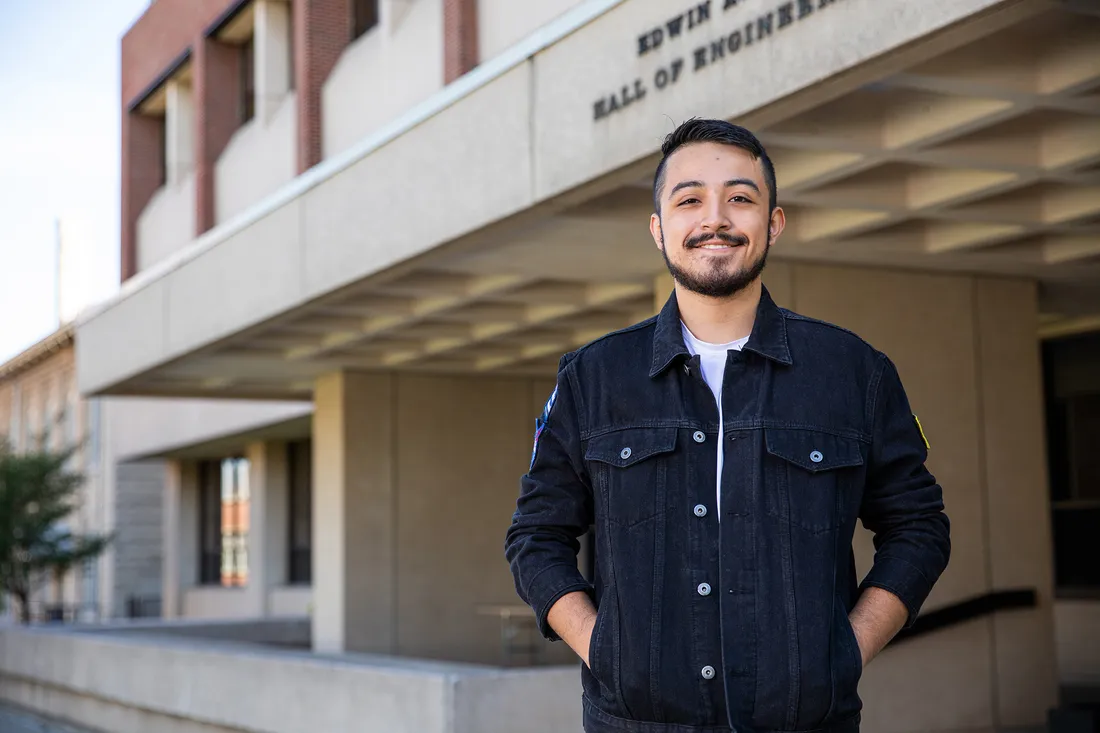
Sophomore Elliot Salas ’24 is consecutively pursuing bachelor’s and master’s degrees in electrical engineering through the College of Engineering and Computer Science’s 4+1 Program. He also minors in computer engineering.
Elliot Salas ’24 remembers when his kindergarten teacher first handed him Volume One of a mini encyclopedia set. The precocious five-year-old flipped to the entry marked “Aerospace” and gazed in rapt amazement at pictures of futuristic spacecraft and launch vehicles. “That’s when I fell in love with outer space,” admits the Syracuse University sophomore, who hopes to pilot his own spaceship someday. “Since then, I’ve often looked to the sky, wondering what awaits discovery next.”
A first-generation student, Salas is using the 4+1 program in the College of Engineering and Computer Science (ECS) to pursue his dreams while consecutively earning bachelor’s and master’s degrees in electrical engineering (EE). He’s rounding out his five-year education with a minor in computer engineering, also in ECS.
Salas plans to join the growing ranks of Syracuse alumni involved with space travel, including Eileen Collins ’78, H’01; Story Musgrave ’58, H’85; and His Royal Highness Prince Sultan bin Salman Al Saud G’99. Common among all of them is a keen appetite for design, innovation and problem-solving—attributes shared by Salas’ childhood hero, Neil Armstrong. “Astronauts work well under pressure,” says Salas, referring to the now-famous incident in which Armstrong’s crewmate Buzz Aldrin used a pen to fix a broken circuit breaker on their lunar module.
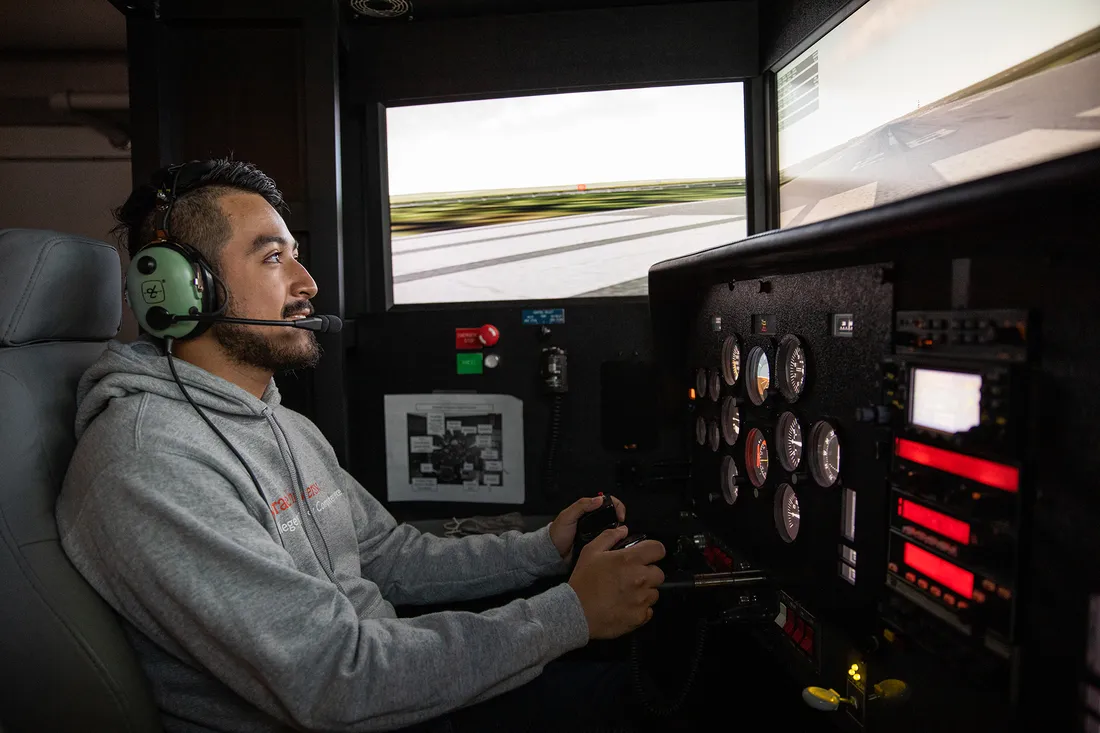
Salas in ECS’ flight simulator, located in Link Hall. Membership in the American Institute of Aeronautics and Astronautics entitles him to fly the simulator, which is one of the most advanced of its kind in the world.
Learning by Doing
Engineering is like oxygen to Salas, who graduated from the Energy Institute High School in Houston. The first magnet school of its kind in the country, the institute gave him a thorough grounding in electricity, electronics and electromagnetism. The school’s project-based learning approach also forced him out of his academic comfort zone. “I did a lot of group projects involving complex questions and real-world problems,” says Salas, who graduated summa cum laude. “It was learning by doing.”
Salas’ schooling culminated with his selection as a Texas High School Aerospace Scholar. The yearlong appointment gave the senior a NASA-centric view of subjects like Earth science, electrical and mechanical engineering, mathematics, and aeronautics. The program also sparked his interest in Artemis I, the first in a series of upcoming NASA missions devoted to human exploration of the moon and beyond. “I graduated high school wanting to be the first person on Mars,” says Salas, a regular at the Johnson Space Center in Houston.
Making electricity work for you isn’t something you just read about in a book. You have to dig deep into the design process, ask difficult questions and challenge the status quo.
Elliot Salas ’24
At Syracuse, Salas is turning his skills and interests into a high-minded career. He currently is brushing up on EE fundamentals—mostly signals and systems, analog and digital signal processing, frequency domain, and communications technology. While introduced to some of these concepts in high school, Salas feels like he is reconnecting with them in a deeper, more intentional way.
Circuit analysis, which involves the designing, building and testing of electrical networks, is his wheelhouse. “It’s fundamental to everything I do,” he says, recalling the time that a professor built a circuit so complex that it virtually defied explanation. “Making electricity work for you isn’t something you just read about in a book. You have to dig deep into the design process, ask difficult questions and challenge the status quo.” Salas hopes such structured, inventive thinking will lead to a job at NASA or one of its private counterparts, like Elon Musk’s SpaceX or Jeff Bezos’ Blue Origin. “There’s no substitute for experience.”
Launching Your Dreams
Ten years ago, Salas’ family lost everything to the Great Recession and was forced to flee Seattle for Houston. His father, a Mexican immigrant with a high school education, struggled to find work. Elliot wondered if he was bound for a similar fate.
Everything changed in April of 2020, when Salas was admitted to Syracuse. “It was one of the biggest days of my life,” he says, adding that several in-state institutions, like the University of Houston, also expressed interest. “Until then, I thought I was destined for vocational school.”
I tell incoming first-gen students that Syracuse can be the launchpad to your dreams. I’m proof of that.
Elliot Salas ’24
Despite the one-two punch of COVID-19 and an unexpected medical procedure after high school, Salas quickly made his presence known on campus. He credits the Office of Financial Aid and Scholarship Programs for lining up grants and scholarships for him and organizations like New Student and Family Programs for providing support of an emotional kind.
One of the first people Salas befriended at Syracuse was Jimmy Luckman, then coordinator of the ‘Cuse First Pre-Welcome Program. His drive and passion were evident on day one, says Luckman. “Elliot took full advantage of the pre-welcome, where he connected with other new students in small-group settings. He also asked a lot of questions. Elliot wanted to be prepared as possible for college.”
Salas has since come full circle, serving as a ’Cuse First Leader for the Pre-Welcome Program. In this capacity, he mentors fellow first-generation students and volunteers at welcome signature events on campus. “I tell incoming first-gen students that Syracuse can be the launchpad to your dreams,” he says. “I’m proof of that.”
Igniting Future Imaginations
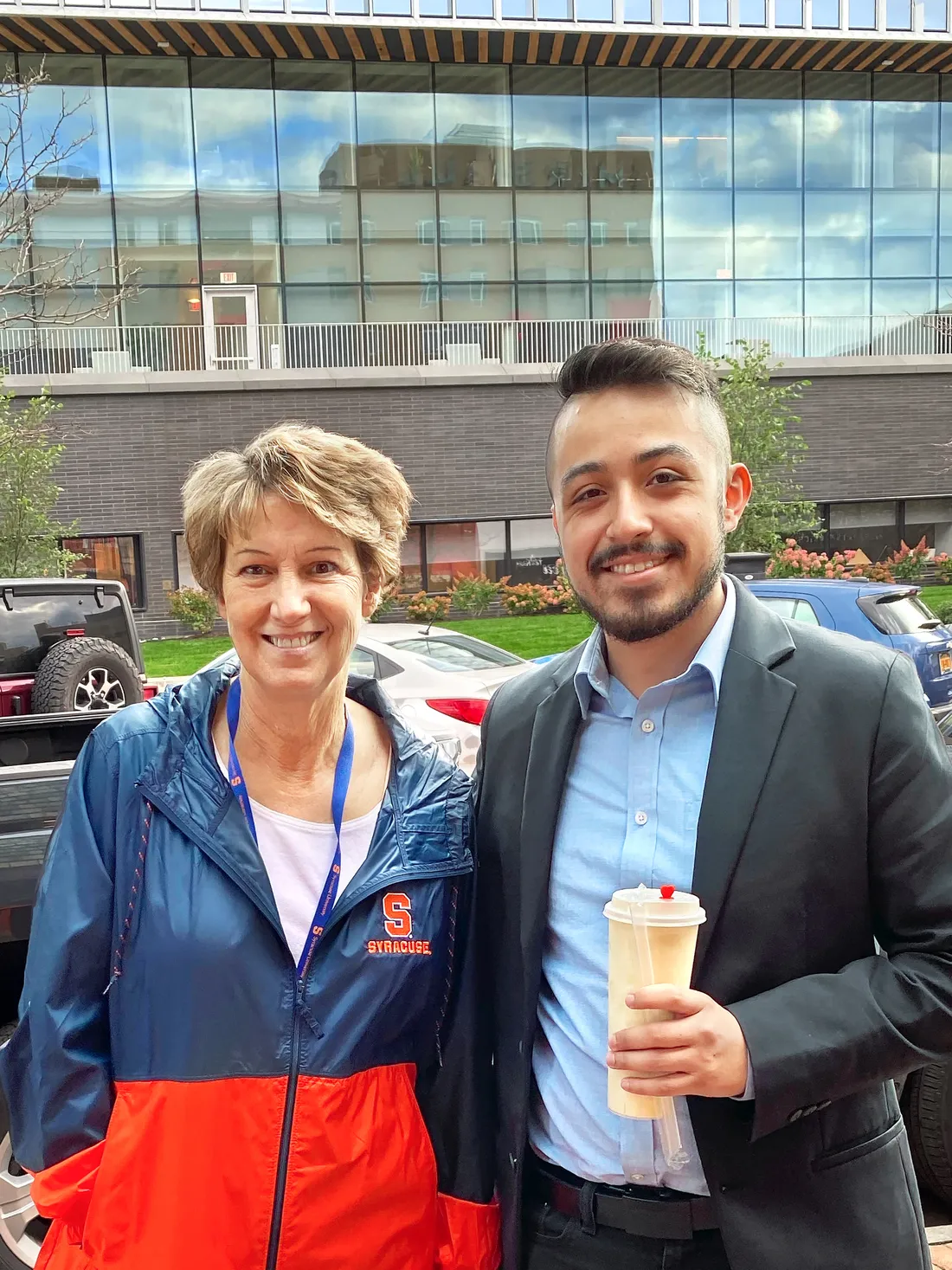
Salas with Eileen Collins ’78, H’01 at last fall's Orange Central. “For a famous astronaut, she’s surprisingly down to Earth,” he says.
If relationships are like mirrors, then Salas has gleaned volumes from peers and professors alike. Bonnie Choi, who taught him piano in the College of Visual and Performing Arts' Setnor School of Music, applauds his “smart, focused and no-nonsense demeanor.” Jared Welch, a junior EE major, nurtures his interest in entrepreneurship.
Jonathan Hoster ’02, G’11 has used his alumni contacts to open doors for Salas. The ECS recruiter recalls how he recently put Salas in touch with NASA’s Benjamin Heyman ’16, giving him first-hand insight into Mission Control operations in Houston. “Elliot brings a warm, welcoming personality to every corner of campus and to all situations. Everyone who meets him is better for it,” Hoster says.
When not cracking the books, Salas may be found doing lab work, flying one of the world's most advanced flight simulators (located in Link Hall) or hobnobbing with luminaries like Eileen Collins ’78, H’01 at Orange Central. “For a famous astronaut, she’s surprisingly down to Earth,” says Salas of the first female pilot and commander of a U.S. space shuttle.
ECS Dean J. Cole Smith describes Salas’ blend of maturity, drive and optimism as “everything we hope to see in a Syracuse student.” “Elliot works hard and takes advantage of engineering opportunities that arise because of his diligence. He also seeks education that complements his major field and engages in creative arts that help him stay well-rounded,” continues Smith, also an electrical engineering and computer science professor. “On top of it all, he finds a way to stay connected to and serve his community.”
Ergo Salas’ involvement with the campus chapters of the American Institute of Aeronautics and Astronautics and the Society of Hispanic Professional Engineers, along with the Take Back the Night planning committee and the Student Association’s Sustainability Committee. He also makes time for his sister, Melanie, a first-year biology major.
One of Salas’ favorite spots is the Catholic Center on Walnut Place, where he volunteers as a sacristan and small-group leader. Father Gerry Waterman smiles at the memory of Salas giving him a small, wooden fisherman nutcracker for Christmas. “Elliot is like a fisher of men and women, bringing people together to practice their faith. He is a kind, generous soul,” Waterman says.
Ever humble, Salas admits that all he wants to do is make his family proud. That his father was recently hired by Tesla Energy Ventures, near Houston, is proof that things are turning around. “The sky’s the limit, right?” Salas asks half-jokingly. Then again, for someone intent on pushing the boundaries of space, the sky is just a starting point.

